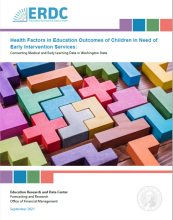This report explores how health factors are associated with children’s early learning outcomes. We focused on a cohort of Washington state children between zero to three years old who participated in the Washington State Early Support for Infants and Toddlers (ESIT) program and have claims record(s) in Washington State All Payer Claims Database (APCD). The results specify the medical diagnoses early learners receive and connects this to their education experience, specifically kindergarten readiness assessment scores and special education enrollment.
The analyses showed that boys, children with a longer duration of services, and children diagnosed with autism, cerebral palsy, Down syndrome, epilepsy, and microcephaly experienced higher rates of special education enrollment and lower kindergarten readiness scores. We concluded that connecting healthcare and education data provides the possibility to identify children with certain medical conditions in need of intervention evaluations and services in addition to medical treatments.


